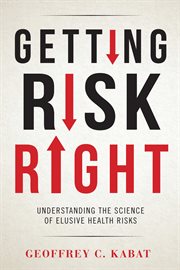Nonfiction
eBook
Details
PUBLISHED
DESCRIPTION
1 online resource
ISBN/ISSN
LANGUAGE
NOTES
Do cell phones cause brain cancer? Does BPA threaten our health? How safe are certain dietary supplements, especially those containing exotic herbs or small amounts of toxic substances? What role does HPV play in the development of cervical cancer, and is the HPV vaccine safe? In four detailed case studies, Geoffrey C. Kabat shows how science works or sometimes doesn't and what distinguishes these two very different outcomes. We depend on science and medicine like never before, yet there is widespread misinformation and confusion, amplified by the media, regarding what influences our health. Getting Risk Right helps general readers distinguish between claims that are supported by solid science and those that are the result of poorly designed or misinterpreted studies. In doing so, he shows us why certain risks are worth worrying about while others are not. Attempts to explain antiscience attitudes often focus on irrational fears and beliefs and the powerful role of business interests. These factors matter, but Kabat also emphasizes the variable quality of research in contested areas of health risks and the professional, political, and methodological factors that can distort the research process. Drawing on recent work in the "meta-analysis" of biomedical research and on insights from leading thinkers, including John Ioannides, Daniel Kahneman, and Cass Sunstein, this groundbreaking book examines factors both internal and external to the science that influence what results get attention and how questionable results can be used to support a particular narrative concerning an alleged public health threat. Kabat, a leading public health thinker, provides a much-needed antidote to what has been called "an epidemic of false claims."
Mode of access: World Wide Web







